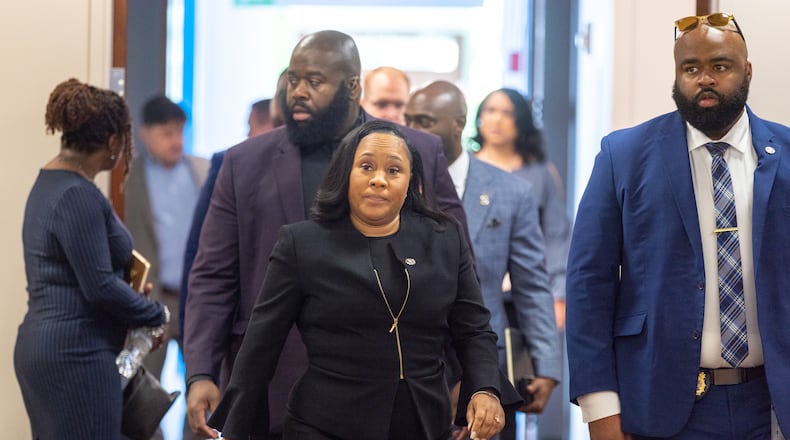Fulton County court officials selected two grand juries Tuesday, one of which is expected to decide whether to hand up an indictment against former President Donald Trump and other well-known political and legal figures for alleged criminal interference in the 2020 presidential election.
Superior Court Judge Robert McBurney presided over the hours-long process, addressing a diverse group of about 100 potential jurors sitting in red chairs in a drab but expansive jury assembly room. Among them were a teacher, a former firefighter, an investigator and an illustrator.
After instructing news reporters not to photograph the potential jurors, McBurney said the two 23-member panels would meet for two months in secret and would be expected to decide whether to approve criminal charges in hundreds of cases. It is unclear which one will consider the case focusing on Trump and his allies.
Credit: arvin.temkar@ajc.com
Credit: arvin.temkar@ajc.com
Fulton District Attorney Fani Willis, who launched an investigation of Trump and his allies more than two years ago, sat behind McBurney and observed the proceedings with two fellow prosecutors from her office.
When a grand jury meets, at least 16 members must be present to conduct business and at least 12 must vote to bring an indictment. The burden of proof is much lower for a grand jury to indict someone than it is for a jury to convict someone. Grand jurors typically hear only from the prosecution.
McBurney told the prospective jurors they would work two days a week – either Mondays and Tuesdays or Thursdays and Fridays – and typically finish by midday or mid-afternoon. Tongue in cheek, the judge added they would be paid a “whopping $25 a day” for their service, if selected.
“I am not trying to sugarcoat it. It is a commitment of time. It is public service,” he said. “It is an imposition on you, but it is a necessary imposition because we don’t simply let police arrest and all of a sudden you have got a court case.
Credit: Arvin Temkar/AJC
Credit: Arvin Temkar/AJC
“There is an intermediate step, where members of the community hear the evidence,” he added. “You at least are a check to make sure that folks aren’t being brought into court for a trial simply because that is what the district attorney or the attorney general wants. It is what the people have affirmed through the true bill of the indictment.”
There was no mention during the public proceeding on Tuesday of Trump or the election probe, although prosecutors met privately with both panels during a 45-minute break. With indictment decisions expected soon, about a dozen reporters were on hand for the grand jury selection, a proceeding that typically draws little attention. In a letter Willis sent county officials almost two months ago, she indicated indictments could be obtained at some point between July 31 and Aug. 18.
Willis began her investigation shortly after hearing a leaked Jan. 2, 2021, phone call in which Trump asked Secretary of State Brad Raffensperger to “find” the 11,780 votes he needed to defeat Joe Biden in Georgia.
She later convened a special purpose grand jury that examined evidence and heard testimony over an almost eight-month period.
In addition to the phone call between Trump and Raffensperger, the panel examined the appointment of a slate of 16 “alternate” Republican electors, testimony lawyer Rudy Giuliani and others gave to Georgia lawmakers, the alleged harassment of a Fulton poll worker and a breach of elections data in Coffee County.
Its final report, only part of which has been made public, said there was no evidence of widespread fraud in the 2020 election, as Trump and his supporters have claimed. It also recommended multiple people be indicted for alleged crimes.
Separately, federal prosecutors are also examining Trump’s efforts to cling to power following the 2020 election.
If Trump is charged in Fulton, it will mark the third indictment against him. In April, a grand jury in Manhattan indicted the former president for allegedly falsifying business records involving hush-money payments to porn star Stormy Daniels.
Last month, a federal grand jury in Florida indicted Trump for 37 counts over his alleged mishandling classified government documents and obstruction of the Justice Department’s investigation. Trump was arraigned June 13 in Miami on 37 criminal counts alleging he took classified papers with him from the White House when he left the presidency and then tried to block authorities when they attempted to reclaim them. Among the charges against Trump are violations of the Espionage Act and obstruction of justice. The Republican, who is running for a second term, has pleaded not guilty.
During Tuesday’s hearing in Atlanta, McBurney asked the potential jurors to say whether they were ready to serve or if they needed to be excused because of any hardships, such as being the sole caregiver for a young child or having a serious medical condition.
“We are going to try to keep a straight face,” he told them, “if you say you have Braves tickets and it’s a day game.”
As he wrapped up the hearing, McBurney thanked them for showing up.
“This took a while,” he said. “Grand juries do important work. If you weren’t selected to serve, you actually missed out.”
Keep Reading
The Latest
Featured


